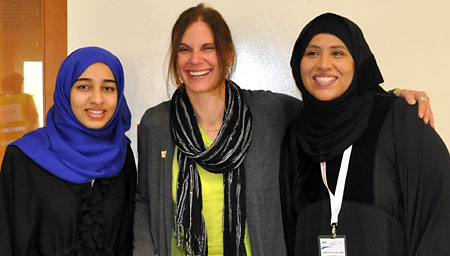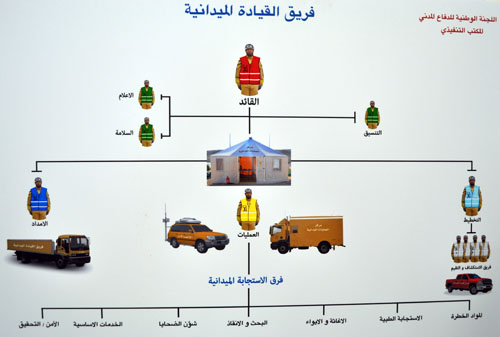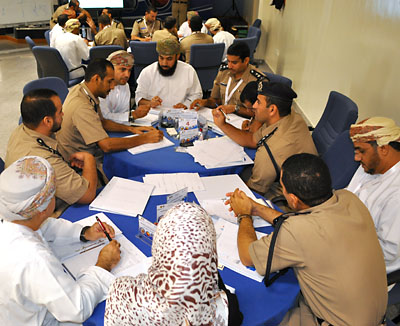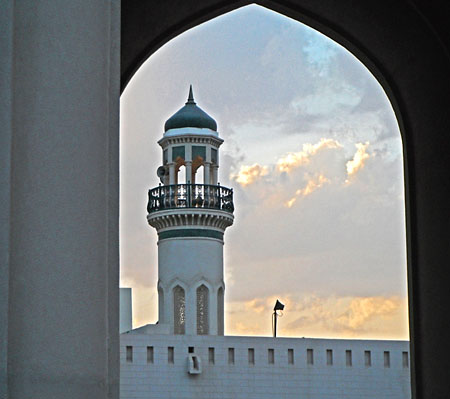home | internet service | web design | business directory | bulletin board | advertise | events calendar | contact | weather | cams

 Maysaa Ambusaudidi, Nan Floyd and Dr. Thamra Al-Ghafri pose for a photograph. Photo courtesy of Nan Floyd Maysaa Ambusaudidi, Nan Floyd and Dr. Thamra Al-Ghafri pose for a photograph. Photo courtesy of Nan FloydOverseas ICS Local smokejumper Nan Floyd recently pulled a different kind of assignment: she spent nine days in Oman talking disaster response, sometimes to English-speaking Omanis and sometimes through an interpreter. “The country had conducted a review of their disaster preparedness and management systems in 2010” and, as a result of the review, decided to a develop a new disaster response plan for Oman, based on the United States’ Incident Command System, Floyd explained. “The main focus of our trip was to provide technical expertise and information” to Omani officials.  A visual aid from the training session showing he structure of the Incident Command System in Arabic. Photo by Nan Floyd A visual aid from the training session showing he structure of the Incident Command System in Arabic. Photo by Nan FloydFloyd traveled to Oman with Damian Rawoot, team leader for the Forest Service International Program, and Bruce Keleman, a retired Forest Service employee from Wenatchee with some 20 years experience in disaster management. The three “spent a week providing support to the Omanis in their work to integrate and adopt ICS into their disaster response framework…not dictating to them, but assisting them with the concepts and ideas from the experiences and knowledge that we have built up over 30 years of the ICS system. “ Floyd, Rawoot and Keleman were training the trainers. The people they interacted with are to become the country’s ICS teaching cadre. Many carried titles such as Doctor, Major, First Lieutenant, or Captain. The people who attended the meetings—from organizations such as the Ministry of Health, the Royal Oman Police, and the Public Authority for Civil Defense and Ambulance—will “integrate (ICS) into their government structures to provide a seamless response in the event of a disaster,” Floyd added.  Training participants—many carrying titles such as such as Doctor, Major, First Lieutenant, or Captain—discuss the Incident Command System. Photo by Nan Floyd Training participants—many carrying titles such as such as Doctor, Major, First Lieutenant, or Captain—discuss the Incident Command System. Photo by Nan FloydICS is typically structured around the functional areas of command, operations, planning, logistics and finance/administration, according to the ICS website. The Incident Command System was pioneered by the U.S. Forest Service, which has been—and is—called on to fight wildfires that sometimes turn into multi-agency efforts, Floyd explained. Such large, multi-agency responses required organization that eventually became standardized as the Incident Command System (ICS). “It started off being for wildfire, but proved applicable in all kinds of responses,” she said. “It has been adopted in the US for major disaster response.” "The ICS is ingrained in our blood," she added. All (U.S.) government agencies are required to work under the ICS system when the feds respond” to a major disaster. Oman is desert, with no forests, Floyd said. The disasters the Omanis are organizing for are likely to be cyclones or oil spills: Floyd learned that about 40% of the worlds oil passes along Oman’s extensive coastline in tankers. "The majority of their water supply comes from desalinization plants,” she added.  Buildings in old Muscat bring out the beauty of nightfall. Floyd found many in the city spoke English and some spoke up to five languages. Photo by Nan Floyd Buildings in old Muscat bring out the beauty of nightfall. Floyd found many in the city spoke English and some spoke up to five languages. Photo by Nan FloydThe Omani ICS training took place in Muscat, a city that is “extremely clean and with very fast roads,” Floyd reported, plus “a very nice infrastructure.” Many Omanis speak English she said and “some of them speak three or four or five languages.” She reported that working through a translator was slow, but that the slower pace lent clarity. Floyd said that she wore conservative clothing for her nine days in Oman—no bare shoulders for instance. In Oman, men traditionally wear white robes, called dishdasha, and women wear black robes called abaya. She said the women at the training were laughing about the cultural differences. If you wear an abaya, Floyd said “you don’t have to think about what you're going to wear in the morning or do your hair.” The weather? "Whew. Hot and very hot. The high was probably 106 or 107.” Favorite Arabic word? “Mumtaz”, which means excellent. Floyd has worked at the North Cascades Smokejumper Base between Twisp and Winthrop since 2001. Before that she was a Redmond, Oregon smokejumper. 6/20/2013 Comments
|